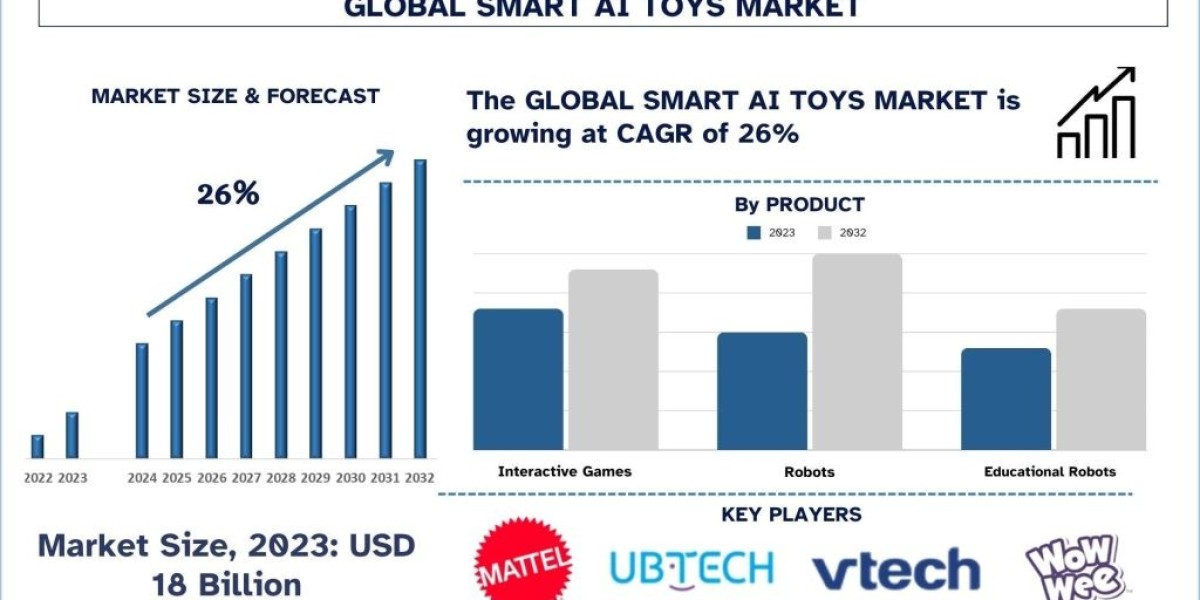Introduction:
In recent years, the toy industry has witnessed a transformative shift with the introduction of smart AI toys, revolutionizing the way children play and learn. These innovative toys incorporate artificial intelligence (AI) to interact, educate, and entertain young users, offering a glimpse into the future of playtime.
According to the UnivDatos Market Insights analysis, the growth in AI, machine learning, and IoT technologies enables more sophisticated and interactive toy functionalities, growing disposable income, and emphasis on toys that promote learning in science, technology, engineering, and mathematics (STEM) will drive the global scenario of the Smart AI Toys market. As per their “Smart AI Toys Market” report, the global market was valued at USD 18 Billion in 2023, growing at a CAGR of about 26% during the forecast period from 2024 - 2032 to reach USD billion by 2032.
For More Detailed Analysis in PDF Format, Visit- https://univdatos.com/get-a-free-sample-form-php/?product_id=63418
From interactive robots to educational companions, smart AI toys are reshaping childhood experiences while raising important questions about safety, privacy, and regulation.
Recent Developments in Smart AI Toys:
The rapid advancement of AI technology has paved the way for increasingly sophisticated smart toys. Companies like Sphero, WowWee, and UBTECH Robotics have introduced a variety of AI-powered products that cater to different age groups and interests:
Educational Companions: Products like the Roybi Robot and Wonder Workshop's Dash teach coding and STEM concepts through interactive play, promoting early learning in a fun and engaging manner.
· On September 20, 2023, UBTECH Robotics announced a strategic partnership with the University of Hong Kong to embark on collaborative research focused on human-like visual perception algorithms and technology for service robots. The research involves the exploration of 3D point cloud data processing and analysis.
Interactive Robots: Robots such as Moflin by Vanguard Industries and Cozmo by Anki (now part of Digital Dream Labs) engage children with their ability to recognize faces, express emotions, and learn from their interactions.
· On June 22, 2023, Hasbro, Inc., a global leader in play, announced that the next era of the cute, cool, and weird Furby interactive toy hit shelves just in time for summer. This Furby features over 600 responses, including phrases, songs, lights, and more.
Augmented Reality Toys: LeapFrog's Magic Adventures Telescope and other AR-enhanced toys blend physical play with digital content, creating immersive learning experiences that stimulate creativity and exploration.
· On September 12, 2023, VTech, a pioneer in innovative parenting technology, launched a product, the V-Care VC2105 Smart Nursery Baby Monitor, which harnesses unique local AI capabilities providing baby sleep analytics and real-time alerts to help deliver the best monitor on the market.
Connected Play: Toys like Barbie's Hello Dreamhouse and Hot Wheels ID integrate AI to enhance play experiences, offering features like voice commands, personalized content, and interactive storytelling.
· On January 4, 2023, WowWee, a China based company, launched Dog-E at CES (Consumer Electronics Show), a global innovator of robotic toys and consumer entertainment products. Dog-E is a groundbreaking robot dog unique to every owner due to over a million combinations of colorful lights, sounds, and personality traits.
Impact on Childhood Development:
The introduction of smart AI toys has sparked considerable interest among parents, educators, and child development experts due to their potential benefits:
· Educational Enhancement: AI toys facilitate learning through interactive experiences, promoting cognitive skills, problem-solving abilities, and creativity.
· Social Interaction: Some AI toys encourage social interaction by simulating conversations and cooperative play scenarios, helping children develop communication skills and empathy.
· Personalized Learning: AI algorithms enable toys to adapt to a child's pace and preferences, providing customized content and challenges tailored to their developmental stage.
However, concerns have emerged regarding the potential risks associated with smart AI toys, particularly related to privacy, security, and the ethical implications of AI interaction with children.
Explore the Comprehensive Research Overview - https://univdatos.com/report/smart-ai-toys-market
Regulatory Challenges and Considerations:
As the popularity of smart AI toys grows, policymakers and regulatory bodies around the world are grappling with how to effectively oversee this emerging industry. Key regulatory considerations include:
Privacy and Data Protection: Smart toys collect and process sensitive personal data, including voice recordings, images, and behavioural patterns. Regulations such as the General Data Protection Regulation (GDPR) in Europe and the Children's Online Privacy Protection Act (COPPA) in the United States aim to safeguard children's privacy online and may apply to smart AI toys.
· In March 2024, the European Parliament stated that all toys sold in the EU will have to have a digital product passport (replacing the EU declaration of conformity) detailing compliance with the relevant safety rules. This will enhance the traceability of toys and make market surveillance and customs checks simpler and more efficient.
Safety Standards: Ensuring the physical safety of smart AI toys is crucial. Regulatory agencies like the Consumer Product Safety Commission (CPSC) in the U.S. and equivalent bodies in other countries set standards for product safety and may adapt guidelines to address AI-specific risks.
· Section 106 of the Consumer Product Safety Improvement Act of 2008 (CPSIA), 15 U.S.C. § 2056b, made ASTM F963 a mandatory consumer product safety standard for children’s toys.
· The Children’s Online Privacy Protection Act (COPPA) is a U.S. law that imposes certain requirements on operators of websites or online services directed to children under 13 years of age and on operators of other websites or online services that have actual knowledge that they are collecting personal information online from a child under 13 years of age.
Ethical Use of AI: The ethical implications of AI interaction with children raise concerns about bias, autonomy, and the long-term impact on social and emotional development. Developing guidelines for responsible AI use in toys is essential to mitigate these risks.
· After the EU announced the draft AI Act, in 2022 Singapore launched AI Verify, an open source AI governance testing framework and software toolkit that validates the performance of AI systems against a set of eleven internationally recognised AI ethics and governance principles through standardised tests, and is consistent with AI governance frameworks such as those from EU, OECD and Singapore.
Transparency and Accountability: Manufacturers are increasingly expected to provide transparent disclosures about how AI technology is used in their toys, including functionalities, data handling practices, and mechanisms for parental control.
Conclusion:
In conclusion, smart AI toys represent a significant evolution in the toy industry, offering new possibilities for learning, creativity, and interaction. While regulatory frameworks are still evolving to address the challenges posed by these technologies, responsible innovation and collaboration among stakeholders will be crucial in shaping a safe and beneficial environment for children to enjoy smart AI toys. As children continue to engage with these interactive and intelligent playthings, ongoing dialogue and proactive measures will be essential to ensure that smart AI toys enhance childhood experiences while upholding privacy, safety, and ethical standards.
Contact Us:
UnivDatos Market Insights
Email - contact@univdatos.com
Website - https://univdatos.com/








